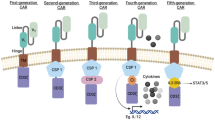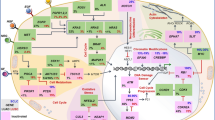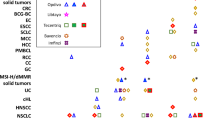Abstract
A wide variety of tumor antigens have been targeted in cancer immunotherapy studies. Traditionally, the focus has been on commonly overexpressed antigens shared across many patients and/or tumor types. As the field has progressed, the identity of human tumor rejection antigens has broadened. Immunologic monitoring of clinical trials has slowly elucidated candidate biomarkers of immune response and clinical response, and conversely, of immune dysfunction and suppression. We have utilized MART-1/Melan-A in our melanoma studies and observed a high frequency of immune responses and several significant clinical responses in patients vaccinated with this melanosomal protein. Alpha-fetoprotein is a shared, overexpressed tumor antigen and secreted glycoprotein that we have tested in hepatocellular cancer vaccines. Our recent studies have identified immunosuppressive and immune-skewing activities of this antigen. The choice of target antigen and its form can have unexpected effects.

Similar content being viewed by others
Abbreviations
- AdV:
-
Adenovirus
- AFP:
-
Alpha-fetoprotein
- CEA:
-
Carcinoembryonic antigen
- DC:
-
Dendritic cells
- EGFR:
-
Epidermal growth factor receptor
- HCC:
-
Hepatocellular cancer
- HPV:
-
Human papilloma virus
- LMW:
-
Low molecular weight
- MAGE-A1:
-
Melanoma antigen family A1
- MART-1:
-
Melanoma antigen recognized by T cells (aka Melan-A)
- nAFP:
-
Cord blood-derived normal alpha-fetoprotein
- NK:
-
Natural killer
- OFA:
-
Oncofetal antigen
- PGE2 :
-
Prostaglandin E2
- TAA:
-
Tumor-associated antigen
- tAFP:
-
Tumor-derived alpha-fetoprotein
- TIL:
-
Tumor-infiltrating lymphocytes
- Treg:
-
Regulatory T cells
- TSA:
-
Tumor-specific antigen
- WT-1:
-
Wilm’s tumor-1
References
Butterfield LH (2015) Cancer vaccines. BMJ 350:h988. doi:10.1136/bmj.h988
Le DT, Wang-Gillam A, Picozzi V, Greten TF, Crocenzi T, Springett G et al (2015) Safety and survival with GVAX pancreas prime and Listeria Monocytogenes-expressing mesothelin (CRS-207) boost vaccines for metastatic pancreatic cancer. J Clin Oncol 33(12):1325–1333. doi:10.1200/JCO.2014.57.4244
Finn OJ, Binder RJ, Brickner AG, Butterfield LH, Ferris RL, Kalinski P et al (2009) Human tumor antigens as targets of immunosurveillance and candidates for cancer vaccines. In: Gires O, Seliger B (eds) Tumor-associated antigens: identification, characterization and clinical applications. Wiley-VCH Verlag, GmbH & Co., Weinheim, pp 23–43
Cheever MA, Allison JP, Ferris AS, Finn OJ, Hastings BM, Hecht TT et al (2009) The prioritization of cancer antigens: a national cancer institute pilot project for the acceleration of translational research. Clin Cancer Res 15(17):5323–5337. doi:10.1158/1078-0432.CCR-09-0737
Butterfield LH, Ribas A, Dissette VB, Amarnani SN, Vu HT, Oseguera D et al (2003) Determinant spreading associated with clinical response in dendritic cell-based immunotherapy for malignant melanoma. Clin Cancer Res 9(3):998–1008
Ribas A, Glaspy JA, Lee Y, Dissette VB, Seja E, Vu HT et al (2004) Role of dendritic cell phenotype, determinant spreading, and negative costimulatory blockade in dendritic cell-based melanoma immunotherapy. J Immunother 27(5):354–367
Butterfield LH, Comin-Anduix B, Vujanovic L, Lee Y, Dissette VB, Yang JQ et al (2008) Adenovirus MART-1-engineered autologous dendritic cell vaccine for metastatic melanoma. J Immunother 31(3):294–309. doi:10.1097/CJI.0b013e31816a8910
Sercarz EE, Lehmann PV, Ametani A, Benichou G, Miller A, Moudgil K (1993) Dominance and crypticity of T cell antigenic determinants. Annu Rev Immunol 11:729–766. doi:10.1146/annurev.iy.11.040193.003501
Disis ML (2011) Immunologic biomarkers as correlates of clinical response to cancer immunotherapy. Cancer Immunol Immunother 60(3):433–442. doi:10.1007/s00262-010-0960-8
Ranieri E, Kierstead LS, Zarour H, Kirkwood JM, Lotze MT, Whiteside T et al (2000) Dendritic cell/peptide cancer vaccines: clinical responsiveness and epitope spreading. Immunol Invest 29(2):121–125
Arthur JF, Butterfield LH, Roth MD, Bui LA, Kiertscher SM, Lau R et al (1997) A comparison of gene transfer methods in human dendritic cells. Cancer Gene Ther 4(1):17–25
Ribas A, Butterfield LH, McBride WH, Jilani SM, Bui LA, Vollmer CM et al (1997) Genetic immunization for the melanoma antigen MART-1/Melan-A using recombinant adenovirus-transduced murine dendritic cells. Cancer Res 57(14):2865–2869
Butterfield LH, Jilani SM, Chakraborty NG, Bui LA, Ribas A, Dissette VB et al (1998) Generation of melanoma-specific cytotoxic T lymphocytes by dendritic cells transduced with a MART-1 adenovirus. J Immunol 161(10):5607–5613
Ribas A, Butterfield LH, McBride WH, Dissette VB, Koh A, Vollmer CM et al (1999) Characterization of antitumor immunization to a defined melanoma antigen using genetically engineered murine dendritic cells. Cancer Gene Ther 6(6):523–536. doi:10.1038/sj.cgt.7700076
Schumacher L, Ribas A, Dissette VB, McBride WH, Mukherji B, Economou JS et al (2004) Human dendritic cell maturation by adenovirus transduction enhances tumor antigen-specific T-cell responses. J Immunother 27(3):191–200
Liu Y, Daley S, Evdokimova VN, Zdobinski DD, Potter DM, Butterfield LH (2006) Hierarchy of alpha fetoprotein (AFP)-specific T cell responses in subjects with AFP-positive hepatocellular cancer. J Immunol 177(1):712–721
Blalock LT, Landsberg J, Messmer M, Shi J, Pardee AD, Haskell R et al (2012) Human dendritic cells adenovirally-engineered to express three defined tumor antigens promote broad adaptive and innate immunity. Oncoimmunology 1(3):287–357. doi:10.4161/onci.18628
Evdokimova VN, Liu Y, Potter DM, Butterfield LH (2007) AFP-specific CD4+ helper T-cell responses in healthy donors and HCC patients. J Immunother 30(4):425–437. doi:10.1097/CJI.0b013e31802fd8e2
Vujanovic L, Szymkowski DE, Alber S, Watkins SC, Vujanovic NL, Butterfield LH (2010) Virally infected and matured human dendritic cells activate natural killer cells via cooperative activity of plasma membrane-bound TNF and IL-15. Blood 116(4):575–583. doi:10.1182/blood-2009-08-240325
Vujanovic L, Ballard W, Thorne SH, Vujanovic NL, Butterfield LH (2012) Adenovirus-engineered human dendritic cells induce natural killer cell chemotaxis via CXCL8/IL-8 and CXCL10/IP-10. Oncoimmunology 1(4):448–457
Naveh HP, Vujanovic L, Butterfield LH (2013) Cellular immunity induced by a recombinant adenovirus human dendritic cell vaccine for melanoma. J Immunother Cancer 1:19. doi:10.1186/2051-1426-1-19
Mailliard RB, Wankowicz-Kalinska A, Cai Q, Wesa A, Hilkens CM, Kapsenberg ML et al (2004) alpha-type-1 polarized dendritic cells: a novel immunization tool with optimized CTL-inducing activity. Cancer Res 64(17):5934–5937. doi:10.1158/0008-5472.CAN-04-1261
Curtsinger JM, Valenzuela JO, Agarwal P, Lins D, Mescher MF (2005) Type I IFNs provide a third signal to CD8 T cells to stimulate clonal expansion and differentiation. J Immunol 174(8):4465–4469
Lozano R, Naghavi M, Foreman K, Lim S, Shibuya K, Aboyans V et al (2012) Global and regional mortality from 235 causes of death for 20 age groups in 1990 and 2010: a systematic analysis for the Global Burden of Disease Study 2010. Lancet 380(9859):2095–2128. doi:10.1016/S0140-6736(12)61728-0
Forner A, Llovet JM, Bruix J (2012) Hepatocellular carcinoma. Lancet 379(9822):1245–1255. doi:10.1016/S0140-6736(11)61347-0
Pardee AD, Butterfield LH (2012) Immunotherapy of hepatocellular carcinoma: unique challenges and clinical opportunities. Oncoimmunology 1(1):48–55. doi:10.4161/onci.1.1.18344
Ormandy LA, Hillemann T, Wedemeyer H, Manns MP, Greten TF, Korangy F (2005) Increased populations of regulatory T cells in peripheral blood of patients with hepatocellular carcinoma. Cancer Res 65(6):2457–2464. doi:10.1158/0008-5472.CAN-04-3232
Lee JS, Chu IS, Heo J, Calvisi DF, Sun Z, Roskams T et al (2004) Classification and prediction of survival in hepatocellular carcinoma by gene expression profiling. Hepatology 40(3):667–676. doi:10.1002/hep.20375
Mizejewski GJ (2002) Biological role of alpha-fetoprotein in cancer: prospects for anticancer therapy. Expert Rev Anticancer Ther 2(6):709–735. doi:10.1586/14737140.2.6.709
Yang ZF, Ho DW, Ng MN, Lau CK, Yu WC, Ngai P et al (2008) Significance of CD90+ cancer stem cells in human liver cancer. Cancer Cell 13(2):153–166. doi:10.1016/j.ccr.2008.01.013
Tomasi TB Jr (1977) Structure and function of alpha-fetoprotein. Annu Rev Med 28:453–465. doi:10.1146/annurev.me.28.020177.002321
Mizejewski GJ (2001) Alpha-fetoprotein structure and function: relevance to isoforms, epitopes, and conformational variants. Exp Biol Med (Maywood) 226(5):377–408
Cohen BL, Orn A, Gronvik KO, Gidlund M, Wigzell H, Murgita RA (1986) Suppression by alpha-fetoprotein of murine natural killer cell activity stimulated in vitro and in vivo by interferon and interleukin 2. Scand J Immunol 23(2):211–223
Yachnin S (1976) Demonstration of the inhibitory effect of human alpha-fetoprotein on in vitro transformation of human lymphocytes. Proc Natl Acad Sci USA 73(8):2857–2861
Um SH, Mulhall C, Alisa A, Ives AR, Karani J, Williams R et al (2004) Alpha-fetoprotein impairs APC function and induces their apoptosis. J Immunol 173(3):1772–1778
Ritter M, Ali MY, Grimm CF, Weth R, Mohr L, Bocher WO et al (2004) Immunoregulation of dendritic and T cells by alpha-fetoprotein in patients with hepatocellular carcinoma. J Hepatol 41(6):999–1007. doi:10.1016/j.jhep.2004.08.013
Butterfield LH, Koh A, Meng W, Vollmer CM, Ribas A, Dissette V et al (1999) Generation of human T-cell responses to an HLA-A2.1-restricted peptide epitope derived from alpha-fetoprotein. Cancer Res 59(13):3134–3142
Butterfield LH, Meng WS, Koh A, Vollmer CM, Ribas A, Dissette VB et al (2001) T cell responses to HLA-A*0201-restricted peptides derived from human alpha fetoprotein. J Immunol 166(8):5300–5308
Butterfield LH, Ribas A, Meng WS, Dissette VB, Amarnani S, Vu HT et al (2003) T-cell responses to HLA-A*0201 immunodominant peptides derived from alpha-fetoprotein in patients with hepatocellular cancer. Clin Cancer Res 9(16 Pt 1):5902–5908
Butterfield LH, Ribas A, Dissette VB, Lee Y, Yang JQ, De la Rocha P et al (2006) A phase I/II trial testing immunization of hepatocellular carcinoma patients with dendritic cells pulsed with four alpha-fetoprotein peptides. Clin Cancer Res 12(9):2817–2825. doi:10.1158/1078-0432.CCR-05-2856
Pardee AD, Yano H, Weinstein AM, Ponce AA, Ethridge AD, Normolle DP et al (2015) Route of antigen delivery impacts the immunostimulatory activity of dendritic cell-based vaccines for hepatocellular carcinoma. J Immunother Cancer 3:32. doi:10.1186/s40425-015-0077-x
Pardee AD, Shi J, Butterfield LH (2014) Tumor-derived alpha-fetoprotein impairs the differentiation and T cell stimulatory activity of human dendritic cells. J Immunol 193(11):5723–5732. doi:10.4049/jimmunol.1400725
Caligiuri MA (2008) Human natural killer cells. Blood 112(3):461–469. doi:10.1182/blood-2007-09-077438
Gao B, Radaeva S, Park O (2009) Liver natural killer and natural killer T cells: immunobiology and emerging roles in liver diseases. J Leukoc Biol 86(3):513–528. doi:10.1189/JLB.0309135
Vujanovic NL, Polimeno L, Azzarone A, Francavilla A, Chambers WH, Starzl TE et al (1995) Changes of liver-resident NK cells during liver regeneration in rats. J Immunol 154(12):6324–6338
Taketomi A, Shimada M, Shirabe K, Kajiyama K, Gion T, Sugimachi K (1998) Natural killer cell activity in patients with hepatocellular carcinoma: a new prognostic indicator after hepatectomy. Cancer 83(1):58–63
Jinushi M, Takehara T, Tatsumi T, Hiramatsu N, Sakamori R, Yamaguchi S et al (2005) Impairment of natural killer cell and dendritic cell functions by the soluble form of MHC class I-related chain A in advanced human hepatocellular carcinomas. J Hepatol 43(6):1013–1020. doi:10.1016/j.jhep.2005.05.026
Sha WH, Zeng XH, Min L (2014) The correlation between NK cell and liver function in patients with primary hepatocellular carcinoma. Gut Liver 8(3):298–305. doi:10.5009/gnl.2014.8.3.298
Hoechst B, Voigtlaender T, Ormandy L, Gamrekelashvili J, Zhao F, Wedemeyer H et al (2009) Myeloid derived suppressor cells inhibit natural killer cells in patients with hepatocellular carcinoma via the NKp30 receptor. Hepatology 50(3):799–807. doi:10.1002/hep.23054
Cardoso E, Valdez G, Comini E, Matera L (1991) Effect of human alpha-fetoprotein on native and in vitro-stimulated NK activity. J Clin Lab Immunol 34(4):183–188
Acknowledgments
This work was supported by University of Pittsburgh Skin SPORE/National Institutes of Health Grant P50 CA121973; National Institutes of Health R01 Grant CA104524; and National Institutes of Health R01 Grant CA138635. This project used the University of Pittsburgh Cancer Institute Immunologic Monitoring and Cellular Products Laboratory shared resource (Lisa H. Butterfield, Director) that is supported in part by National Institutes of Health Grant award P30CA047904. The author acknowledges the support of Melanoma Program colleagues Dr. John M. Kirkwood, Dr. Ahmad A. Tarhini, and Dr. Hussein Tawbi in the current melanoma clinical studies. The author also thanks the current and recent members of the Butterfield research laboratory (Lazar Vujanovic, Patricia Santos, and Angela D. Pardee).
Author information
Authors and Affiliations
Corresponding author
Ethics declarations
Conflict of interest
Lisa H. Butterfield is co-inventor of patents covering aspects of alpha-fetoprotein as a target for T cell-mediated anti-hepatocellular cancer immunity.
Additional information
This paper is a Focussed Research Review based on a presentation given at the Fourth International Conference on Cancer Immunotherapy and Immunomonitoring (CITIM 2015), held in Ljubljana, Slovenia, 27th–30th April 2015. It is part of a series of Focussed Research Reviews and meeting report in Cancer Immunology, Immunotherapy.
Rights and permissions
About this article
Cite this article
Butterfield, L.H. Lessons learned from cancer vaccine trials and target antigen choice. Cancer Immunol Immunother 65, 805–812 (2016). https://doi.org/10.1007/s00262-016-1801-1
Received:
Accepted:
Published:
Issue Date:
DOI: https://doi.org/10.1007/s00262-016-1801-1




